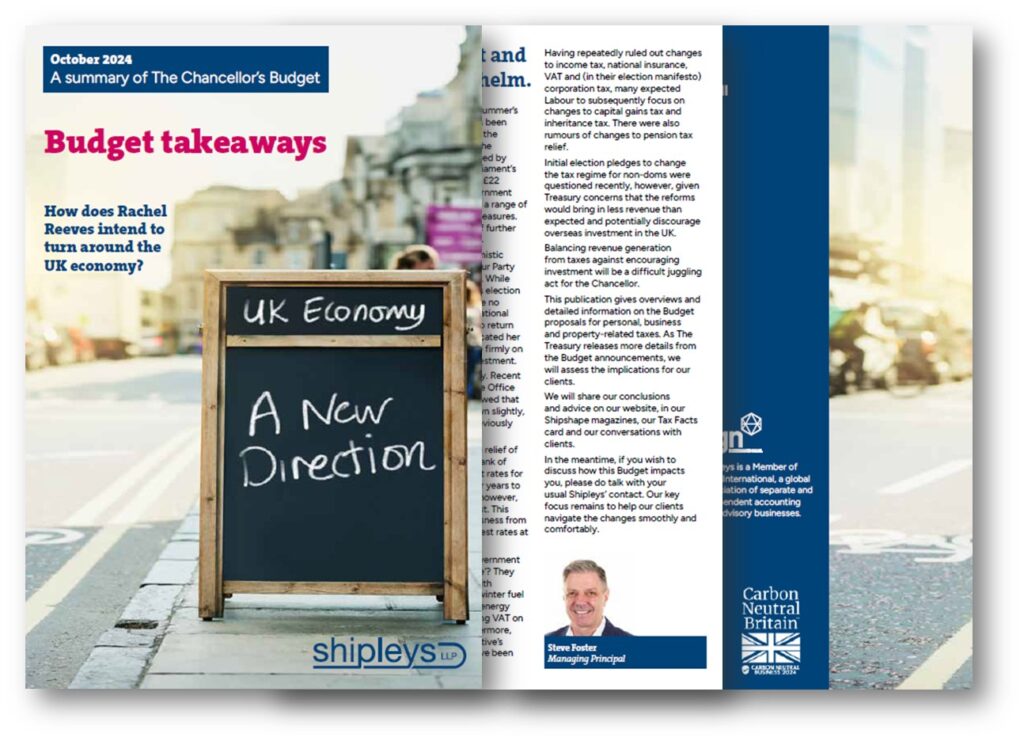In this summary, we’ve explained the key developments and changes from the Chancellor’s Budget announcement on 30 October 2024. For a pdf version of our full October 2024 Budget Summary click the green download pdf button on the right.
In this overview:
- Background To The Budget
- Download Our Full Summary of The Budget
- Key Highlights From The Budget
- Final Thoughts – Can We Help?
Background to the Budget
So, a new government and Chancellor are at the helm.
Since Labour’s win in the summer’s general election, there has been intense speculation about the contents of this Budget. The depressing statement issued by Rachel Reeves before Parliament’s summer recess revealed a £22 billion “black hole” in government finances for this year, plus a range of immediate cost-cutting measures. At the time, she warned of further “difficult decisions” ahead.
A challenging balancing act
Having repeatedly ruled out changes to income tax, national insurance, VAT and (in their election manifesto) corporation tax, many expected Labour to subsequently focus on changes to capital gains tax and inheritance tax.
As both the Prime Minister and Chancellor have been at pains to point out in recent days and weeks, balancing revenue generation from taxes against encouraging economic growth will be a difficult juggling act.
While Reeves reiterated Labour’s election pledge that there would be no increases in income tax, national insurance or VAT – and “no return to austerity”, she also indicated her first Budget would have its eye firmly on economic growth and investment.
A new direction is needed
Economic growth and investment is indeed a key priority. Recent quarterly releases from the Office for National Statistics showed that the UK economy had grown slightly, but not by the amount previously forecast.
Back in August, and to the relief of many homeowners, The Bank of England finally cut interest rates for the first time in nearly four years to 5% from 5.25%. Inflation, however, remained at 2.2% in August. This prompted further cautiousness from the Bank, which held interest rates at 5% in September.
Plugging the ‘black hole’
So how is the new Government looking to plug the ‘black hole’? Prior to the Budget, they had already been busy with controversial changes to winter fuel payments, increasing the energy windfall tax and announcing VAT on private school fees. This publication gives overviews and detailed information on the Budget announcements and their implications for personal, business and property-related taxes.
Key highlights from the October 2024 Budget
- The main rates of class 1, class 1A and class 1B employer national insurance contributions (NICs) will be increased from 13.8% to 15.0%, and the secondary threshold at which employer NICs are payable will be reduced from £9,100 to £5,000, both with effect from 6 April 2025
- The main rates of capital gains tax will increase with immediate effect, with the lower rate moving to 18% and the higher rate to 24%, aligning them with the current rates for residential properties. The rate for business asset disposal relief will rise to 14% from April 2025 and to 18% from April 2026
- Inheritance tax (IHT) business and agricultural reliefs will be capped so that 100% relief will apply to the first £1 million of combined agricultural and business property, with 50% relief for anything above this and to AIM-listed shares
- Unused pension funds and death benefits will form part of a person’s estate for IHT purposes from 6 April 2027.
- The additional SDLT rate for second homes and buy-to-let properties increases from 3% to 5% from 31 October 2024. The temporary increases in the 0% SDLT band for first-time and other property buyers will end on 31 March 2025.
- VAT at 20% will be applied to private school education and boarding services from 1 January 2025. From 1 April 2025, charitable relief for English business rates will be withdrawn.
- Subscription limits for ISAs, JISAs and LISAs will be frozen until April 2030.
Final thoughts
As The Treasury releases more details from the Budget announcements, we will assess the implications for our clients. We will share our conclusions and advice on our website, in our Shipshape magazines, our Tax Facts card and in our conversations with clients.
In the meantime, if you wish to discuss how this Budget impacts you, please do talk with your usual Shipleys’ contact. Our key focus remains to help our clients navigate the changes smoothly and comfortably.
This Budget Summary is based on the Chancellor’s Budget Statement on 30 October 2024, supplemented by information from official publications.
It reflects our understanding of proposed changes to tax law and practice at the date of publication but is not a complete and definitive guide. The Budget proposals may be amended before the Finance Bill becomes law.
Specific advice should therefore be obtained before taking action, or refraining from taking action, on the basis of this information.
© 2024 Shipleys LLP






















